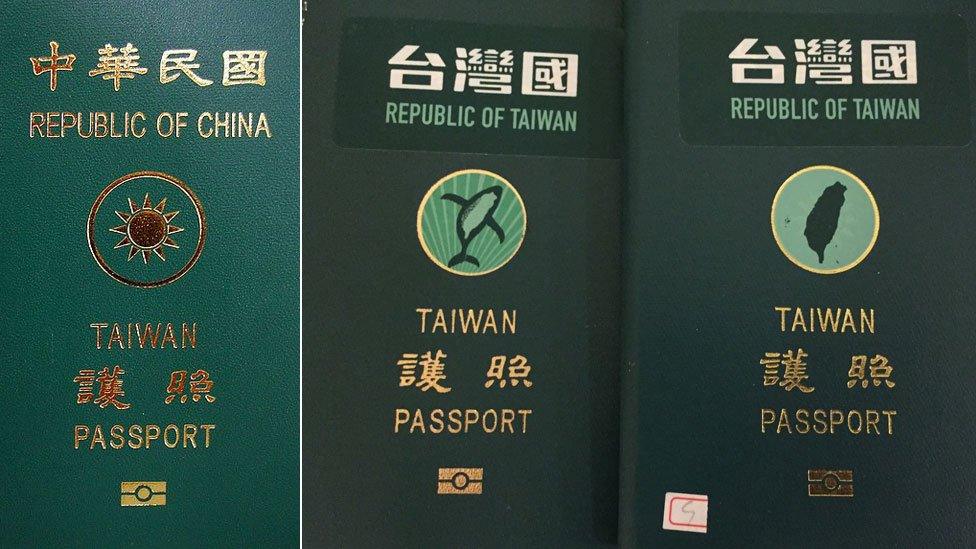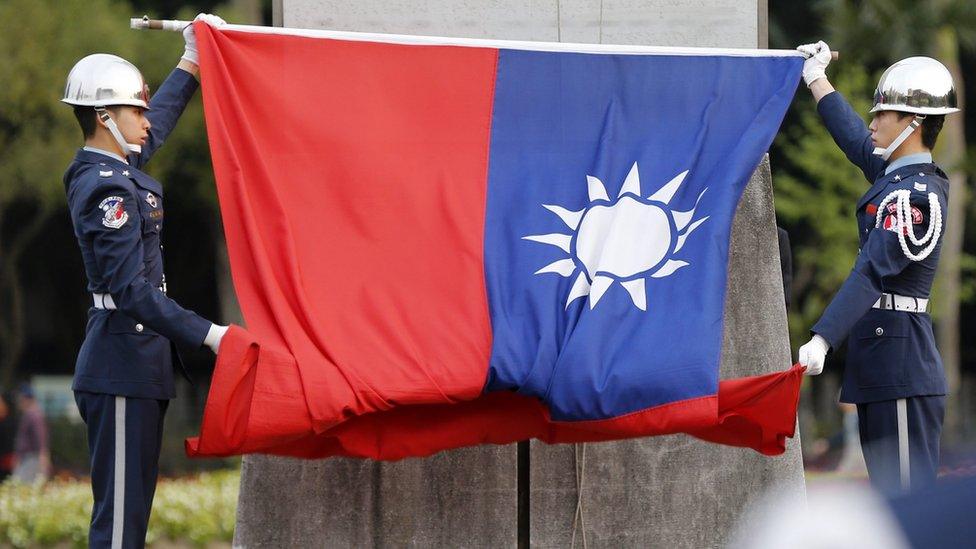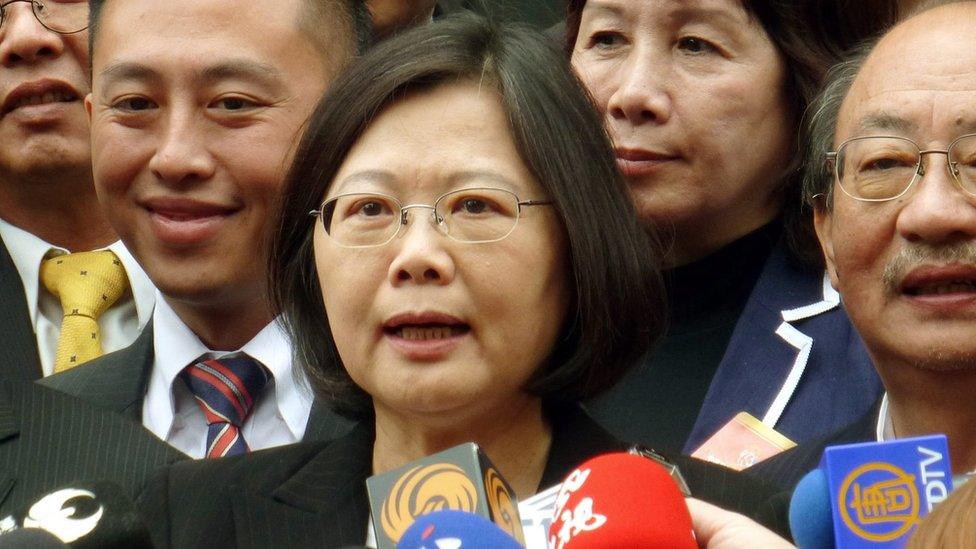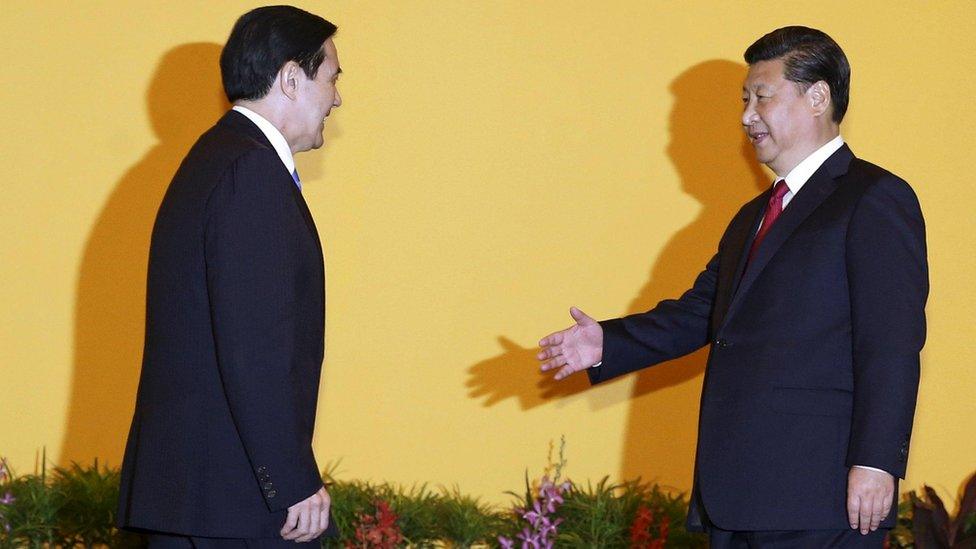'Taiwan Republic' passport stickers cause a stink in China
- Published

An original Taiwanese passport (L) and modified documents (R)
The news that Taiwan's parliament has effectively authorised travellers to attach "Taiwan Republic" stickers to their passports has sparked heated discussion in mainland China.
Parliament decided on 6 April to lift the punishments for Taiwan passport holders who "add, modify or delete markings" from their travel documents.
The controversial stickers, which replace "Republic of China" with "Republic of Taiwan", became a popular trend when they launched in August last year.
However, China's government sees them as a symbol of Taiwanese independence and has refused entry to passport holders who sport them.
Denied entry
During the parliamentary session that saw the punishments overturned, the government warned holders that they must still "bear the risks" of having such stickers on their passports.
A number of Taiwanese travellers have been denied entry into China and other countries as a result of the stickers.
The Macau Daily Times reported in February that 15 Taiwanese citizens had been refused entry into the special administrative region of China, as a result of the "politically controversial and sensitive" stickers.
The same month, two Taiwanese travellers were denied entry into Hong Kong "on the grounds that their passports had been altered without permission" according to independent news website Hong Kong Free Press.
In December, three travellers were denied entry into Singapore.

China has been pushing Taiwan's leader to make clear its stance on independence
Following the Taiwanese move to authorise the stickers, Chinese state-run national newspaper Global Times warns that travellers may be denied entry further afield.
"The mainland's influence is much bigger than Taiwan's," it says in an editorial. "As long as the mainland is willing, it is not hard to stonewall those with the 'sticker passports' at immigration control points everywhere in the world."
'Poisons trust'
Chinese state media have condemned the ruling that the stickers are no longer deemed to "add, modify or delete markings" from official travel documents.
The overseas edition of government mouthpiece People's Daily warns that authorisation of the stickers may lead to other forms of rebellion.
"If Taiwan allows its passport covers to be 'changed', will it allow people to change their identity cards, driving licence, marriage certificate or 'legal declarations'?" it asks.
"How will documents issued by Taiwan remain authoritative? How can we trust it if it is allowing people to change the 'country'? Is this a game of the 'Legislative Yuan' or an 'asylum for the insane'?"
English-language newspaper China Daily similarly warned that the stickers will result in "more Taiwanese compatriots bringing trouble and controversy".
It said that the ruling "only further poisons trust across the Taiwan Straits".
'Tsai's masterpiece'
Social media users on the popular Sina Weibo microblog are worried about the ruling, with many saying the news is "laughable" and that holders of such stickers have a "death wish".
"The international community knows that Taiwan is a province of the mainland, those still saying that Taiwan is a country are shameless," says 'Xu Xiaose'.

Taiwanese president-elect Tsai Ing-wen will be sworn in on 20 May 2016
"This is Tsai's masterpiece", one user says, suggesting that the stickers are part of a subtle campaign by president-elect Tsai Ing-wen to garner support for Taiwanese independence.
Another user says it is an example of Tsai using "more trickery", as she has not made clear whether or not she recognises that Taiwan is an independent country.
"Sooner or later, the Taiwanese will have to pay a price for their choice," adds 'Shaowei Guancha'.
BBC Monitoring reports and analyses news from TV, radio, web and print media around the world. You can follow BBC Monitoring on Twitter, external and Facebook, external.
- Published20 January 2016
- Published7 November 2015
